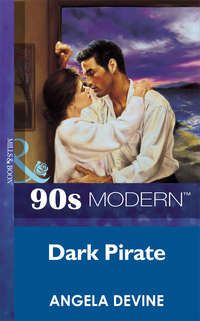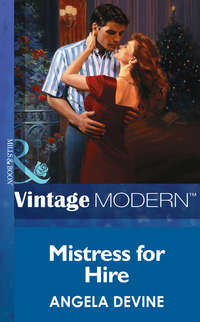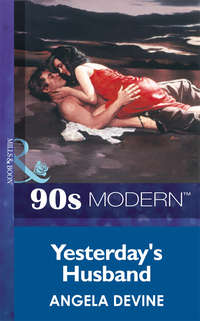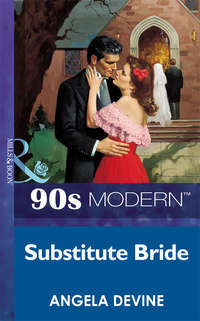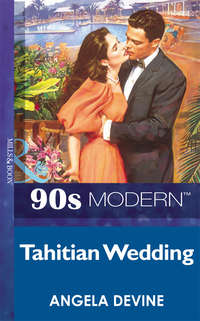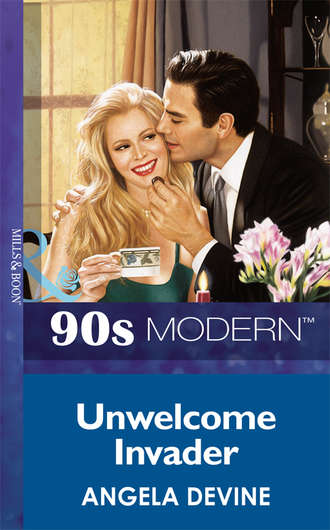
Полная версия
Unwelcome Invader
‘Have you drowned in there?’ demanded a deep, masculine voice. ‘Must I come in and rescue you? I can break the lock if you’re in difficulties.’
Alarmed at the threat, Jane scrambled out of the bath and began hastily to dress. Once she was dry she hesitated in front of the mirror, then wiped off the steamy glass with her towel and looked at herself critically. If she had been alone, she would have put on comfortable old pyjamas and some sheepskin boots. As it was, she paused indecisively. Should she put on an even older pair of clean jeans and a more ragged windcheater as an act of defiance, or dress up to the nines?
From childhood onwards Jane had always tried to tackle difficult situations by making sure that she looked her very, very best. Somehow it always helped to control those butterflies of insecurity in her stomach. But if she dressed nicely mightn’t this arrogant stranger think that she was trying to lead him on? She stared at herself in the mirror. Long, curly blonde hair, wide green eyes, heart-shaped face with a small pointy chin and a wide, defiant mouth.
‘Why should I care what he thinks?’ she demanded aloud. ‘I’ll wear whatever I like!’
Kneeling down, she unzipped her bag and took out clean underwear, tights, shoes and the one wild extravagance of her French trip—a dress of pale green clinging georgette, which clung to the curves of her body and made her look ten thousand times more sexy and sophisticated than she ever usually did. Jane scrambled into these clothes, brushed her hair, sprayed herself with Arpège, fastened a gold and pearl-drop necklace around her throat and applied a glossy scarlet lipstick to her lips. Then, squaring her shoulders and ready to do battle, she opened the bathroom door and charged.
‘Go into the dining-room,’ called a masculine voice, which was already beginning to be hatefully familiar. ‘I’ll be with you in a moment.’
Jane gasped as she entered the dining-room. The large cedar dining-table that she and her father only ever bothered to set for special occasions like Christmas dinner was covered with an exquisite lace tablecloth. At one end two places were set; candles burned in silver candelabra and their gentle, flickering light winked off crystal glasses, heavy silver cutlery and the best Wedgwood china. Mouthwatering scents drifted in from the kitchen. Some kind of delicious beef stew, with an undertone of other delights. Fresh bread and something fruity and spicy. An apple tart perhaps? Jane’s spirits revived magically. She might be small and even rather frail-looking, but she had a formidable appetite. Perhaps there was something to be said for having mad Frenchmen take over the house if they cooked like this!
A moment later the mad Frenchman entered the dining-room. He paused at the sight of Jane and a small, approving smile lit his face.
‘Very chic,’ he murmured. ‘I congratulate you, mademoiselle. I half expected you to appear looking like a grape-picker after the harvest.’
Jane flushed, torn between pleasure and annoyance.
‘Can I do anything to help in the kitchen?’ she asked.
‘But no, it is all organised. I had only to heat things up. Have a glass of sherry and I’ll bring in the soup.’
He moved across to the sideboard and turned back to look enquiringly at her as his hand hovered above the bottles.
‘A medium dry Reynella, please,’ she said.
‘A very good choice. I think I’ll join you. Now, please sit down at the table and we’ll eat.’
Jane sipped the pale, straw-coloured, nutty-flavoured liquid and stared wonderingly after Marc’s departing back as he vanished into the kitchen. Moments later he returned, first with a couple of hot bread rolls in a napkin and then with two bowls of clear soup.
‘Consommé Julienne,’ he announced, setting one down in front of her.
‘Bon appetit,’ said Jane automatically.
‘Ah, you speak French?’ asked Marc with interest.
‘Not really,’ she replied. ‘Certainly not fluently, but I’ve just spent six months in the Champagne district.’
‘Really? What were you doing there?’
‘Learning more about winemaking.’
‘And is this a hobby, or your profession?’
‘My profession,’ said Jane proudly.
‘You’ve trained in it?’
‘Yes. After I finished school I did a winemaking course in South Australia, worked for a year at Penfold’s and then came back here to Tasmania to try and start a family vineyard. That was five years ago.’
‘So it’s your hand that’s been at work planting the vines and setting up the equipment? Are you the one who masterminded the whole enterprise?’
‘Yes,’ agreed Jane with satisfaction. ‘I put in Riesling and Cabernet Shiraz vines several years ago. Since then I’ve planted and pruned and irrigated. It’s been hard work, although I’ve had some help from my father and from Charlie Kendall, who works for us. In fact, Charlie became so good at handling everything that I felt I could afford to go to France for six months to learn more about the trade.’
‘You’ve done well,’ said Marc. ‘It’s an impressive little operation, although it would have been wise to put more nets over the vines. It protects them from birds and prevents the risk of botrytis.’
‘You know about wines yourself, then?’ asked Jane, intrigued in spite of herself.
‘It’s in the blood,’ replied Marc. ‘My family have been winemakers near Bordeaux for the last five hundred years.’
‘Then what on earth are you doing here?’ demanded Jane in a baffled voice.
‘All in good time,’ he said, rising to his feet. ‘Have you finished your soup? May I take your bowl?’
After he had vanished into the kitchen again, Jane sipped her sherry and frowned thoughtfully. There was a mystery about Marc that intrigued her. Who was he? What was he doing here? If they had met in different circumstances, she might have found him fascinating. As it was, she felt very, very troubled and uneasy.
A moment later he returned and set a bubbling iron casserole on to a hot pad. Jane inhaled ecstatically, revelling in the mingled odours of stewed beef, red wine, bayleaf, black pepper.
‘Boeuf à la bourguignonne,’ she breathed.
‘Ah, your nose does not fail you,’ said Marc. ‘But the real test is with the wine. Tell me what you think of this.’
He fetched a decanter from the sideboard and poured a small quantity of purplish-red liquid into the bottom of Jane’s crystal wine glass. She raised it to her nose, inhaled, swirled and then drank.
‘It’s magnificent!’ she said. ‘Very rich and well-balanced, with a lace-like finesse and incredible ripe fruit aromas.’
‘Quite right,’ he agreed. ‘You’ve learned a lot in France.’
Jane helped herself to a substantial serving of the stew, accompanied by waxy new potatoes and carrots in a herb butter. For the moment she had almost forgotten her dislike and distrust of Marc Le Rossignol.
‘Oh, I did,’ she agreed eagerly. ‘It’s an amazing place; there’s so much skill, so much dedication, so much tradition. The French winemakers are wonderful.’
‘Ah, yes. But where there is appreciation there must also be a faculty for criticism,’ said Marc. ‘What did you find to criticise there?’
‘Well——’ said Jane doubtfully.
‘Please, don’t spare my feelings. Be perfectly frank with me.’
‘Perhaps too much emphasis on tradition,’ she said. ‘Sometimes they seem a little hidebound, unwilling to try new things.’
‘I couldn’t agree with you more. Australian wine-makers are often more adventurous, more willing to use new technology. I think Australia is a very exciting place at the moment for anyone seriously interested in wine. That’s why I’m here.’
Jane put down her fork and gave him a troubled look.
‘Why are you here?’ she demanded bluntly.
With another of his mocking smiles, Marc changed the subject.
‘Are you fond of cooking?’ he asked.
Jane was annoyed but decided not to pursue the subject further, at least for the moment. Yet all her initial dislike of Marc Le Rossignol came surging back at full strength. During the remainder of the meal she confined herself to terse replies to his questions. Her only weak moment came when Marc produced a pear and brown sugar tart that was so good she had to acknowledge it.
‘That was superb,’ she said grudgingly. ‘Can you always produce a three-course meal at a moment’s notice?’
Marc smiled.
‘Usually,’ he agreed. ‘I’m fond of good food and fortunately I had some substantial leftovers from last night’s meal. Also fortunately, I was too busy to eat anything much earlier this evening.’
‘Too busy doing what?’ asked Jane.
Their eyes met.
‘You’ve bathed, you’ve eaten,’ said Marc, as if he were a doctor assessing a patient’s progress. ‘I think perhaps you’re ready to face the truth now. Come into the sitting-room and we’ll have our little discussion.’
Hardly able to contain her alarm, Jane followed him into the sitting-room next door. There was a fire burning in the fireplace and the room seemed comfortably inviting with its smell of lemon furniture polish, woodsmoke and old leather couches. There were no curtains but cedar shutters kept out the chill night air, and the faded Persian rug on the floor, with its now dim patterns of scarlet and royal blue, looked reassuringly familiar. The grandfather clock in the hall ticked stoically and then struck once with a reverberating boom as Jane lowered herself into a comfortable chintz armchair by the fire. One a.m. Somehow the sound had an oddly sinister ring, as if it heralded the end of everything she had ever known and loved, as if this man had come like some dangerous enchanter to change her world forever. A feeling of growing alarm clamoured inside her.
‘What are you doing here?’ she burst out. ‘Why have you taken over my home?’
‘It’s very simple,’ said Marc, standing with one arm draped along the mantelpiece. ‘You really are Colin West’s daughter, aren’t you?’
‘Yes.’
‘Well, I can’t imagine why your father hasn’t told you this, but it seems I must be the one to do so. There have been some big changes here. In the first place your father has sold off all his sheep. Secondly…’ He paused.
‘Secondly?’ prompted Jane with an ominous sense of misgiving.
‘I have leased this property from him with an option to purchase at any time during the next three months.’
Jane gasped as the implications of his words slowly sank in.
‘You mean…you could buy this place any time you want to in the next three months?’
‘Exactly,’ agreed Marc.
For a moment Jane was shocked speechless.
‘The house? The vineyards? The outhouses…everything?’ she stammered at last.
‘Everything,’ he agreed gravely.
Suddenly Jane’s disbelief was replaced by anger-hot and rich and murderous.
‘But that’s ridiculous!’ she cried wildly, jumping to her feet. ‘This has been my home ever since I was born. And the vineyards, the winemaking plant…’ Her voice broke. ‘What happens to those?’
Marc’s face was inscrutable. With the firelight leaping over his features he looked uncannily like some stage demon.
‘All fixed property is included in the sale,’ he said in measured tones. ‘Naturally that means all of the vineyards and most of the winemaking plant. Movable property may be taken with you, but that won’t be much. Only the wine collection, the empty barrels, the ladders, buckets, a few pruning shears. The rest will all be mine if I decide to go ahead with the purchase.’
Jane stumbled desperately across the room, hot tears stinging behind her eyes, then she turned on him like an animal at bay.
‘That’s impossible! I was the one who put up the money for most of this. I had a legacy from my grandmother and I spent every cent of it on this place. My father can’t just sell it behind my back without my approval!’
Marc shrugged. His voice was very calm and cool and seemed to come from a great distance.
‘I checked the legal details very carefully before I entered into this contract. I always do. There is no doubt that your father is the legal owner of this property, nor that it is unencumbered by any mortgages. These payments you say you made on the vineyards, the wine plant…have you any proof of this?’
Jane was furious at his sceptical tone.
‘I don’t just say I made the payments!’ she shouted. ‘I did make them!’
Marc’s voice continued relentlessly, as if he had scarcely heard her impassioned interruption.
‘No doubt you have documents to prove this?’
Jane’s head swam with exhaustion and disbelief.
‘Yes. No. Not exactly. After I inherited the money from my grandmother my father persuaded me to form a company. It was all terribly complicated.’
‘Not Saddler’s Vineyards Limited, by any chance?’ asked Marc in a hushed voice.
‘Yes,’ said Jane uneasily.
‘Parbleu!’ exclaimed Marc, leaving his place by the mantelpiece and crossing the room to her. ‘I’m extremely sorry for you, Jane. It seems to me that your father has…what’s the expression you Australians use?…sold you down the river. I’ve seen the documents governing the formation of that company. Your father is chief managing director and has a controlling interest in it. You were a very foolish girl to hand over control of your assets to another person in such a manner. What possessed you to do such a thing?’
Jane’s head came up and her eyes blazed. Her blonde hair seemed to crackle around her shoulders with a life of its own.
‘Because I trusted him!’ she cried. ‘OK? I trusted him! He’s my father, for heaven’s sake. He wouldn’t do a thing like this to me.’
‘Wouldn’t he?’ asked Marc quietly.
With a low groan Jane crossed to the fireplace and stood staring unseeingly into the leaping flames. Certain bitter memories of her mother came back to her.
‘Maybe he would,’ she admitted at last in a defeated voice. ‘Oh, not deliberately, I suppose. He’d feel certain that he was doing the right thing and he’d excuse it to himself somehow. Tell himself that he was going to make huge profits for me by putting it into some harebrained scheme of his own. My mother always complained that he ran through all her money before they split up. I used to think it was just bitterness, but now I’m not sure…Are you telling me that I’m financially ruined?’
‘Only if I go ahead with the purchase of this property,’ said Marc. ‘If I don’t, there’s a chance you might regain control of your assets.’
Jane swung round.
‘Then don’t do it!’ she cried passionately. ‘Please, please don’t do it! You said yourself it’s an impressive little vineyard and I’ve worked hard on it. Don’t make me give it up.’
Marc shook his head fastidiously.
‘Why should it matter to me?’ he asked.
CHAPTER TWO
‘BECAUSE it’s a question of simple decency!’ cried Jane.
Marc gave her a baffled look, as if he had never heard the word in his life.
‘I still don’t see what it has to do with me,’ he said dismissively. ‘Obviously, the first thing we need to do is phone your father tomorrow morning in New Zealand and find out exactly what the legal position is.’
‘Legal position!’ protested Jane. ‘That’s all that matters to you, isn’t it? The legal position! Don’t you have any feelings at all?’
Marc’s face remained completely impassive. Only the eyes seemed alive—dark, brooding, thoughtful. But his face might have been carved out of granite for all the encouragement it gave her.
‘This is nothing but a business transaction to me,’ he said. ‘I’ve made an extremely generous payment to your father for the option to purchase this property. I’ve also had to make extensive arrangements in France to cover my absence in Australia for three months. Why should I throw away all that when there’s no certainty that I could even help you by doing so?’
Jane gave a defeated sigh. He was quite right. Why should he? After all, it was her own stupid fault she was in this position, although that didn’t make it any easier to bear. Quite the reverse, in fact. She felt shaken, humiliated, betrayed. And instead of making some attempt to comfort her this unfeeling stranger simply stood there, staring at her as impassively as a judge.
‘What are you going to do with the place if you do buy it?’ she demanded accusingly. ‘Winemaking here is a lot different from in France.’
He smiled with unexpected charm.
‘That’s half the attraction for me,’ he said. ‘I want to be one of the flying winemakers. It’s tremendous good luck that the seasons are reversed in the two hemispheres. By spending half the year in Europe and half the year in Australia I can have two vintages. Twice the chance to make superb wine, plus the best of French tradition and Australian innovation. It seems ideal to me.’
‘And you’re prepared to ruin me to do it?’ demanded Jane bitterly.
‘You’re being melodramatic, chérie. You’re not ruined yet. And even if you were, it would be entirely your own doing. You’ve been a naïve, impetuous little fool, you know.’
Jane caught her breath sharply and clenched her fists.
‘You patronising——! I hate you. I wish you’d never come here!’
‘I begin to wish it myself,’ murmured Marc as he met her scowling gaze. ‘You have no manners at all, mademoiselle. You attack me with bottles and torches—what next will it be? A pitchfork? Or just your own teeth and claws? Now that might be interesting.’
Something in that husky drawl sent a throb of unwilling excitement through Jane’s body, which only annoyed her still further. She made an impatient movement towards the door but found that Marc was blocking her way. He made no attempt to move, but simply stood there—large, threatening and intensely masculine. She paused, irresolute, not wanting to make an undignified and very obvious detour around him, but the pause was a mistake. Looking up into those mocking brown eyes, she was suddenly conscious of another reluctant thrill of attraction to him, of an electric tingling in her limbs that filled her with an insane urge to move into his arms. The scent of his cologne, spicy and erotic, drifted into her nostrils and her senses swam. Horrified, she broke away and retreated to the door.
‘Don’t worry!’ she snapped. ‘I’m not going to do anything else to hurt you.’
Marc turned and looked at her with amusement.
‘I don’t believe you could hurt me,’ he said. ‘And where are you off to now? If you’re planning to run off somewhere and sob your heart out, I forbid it.’
Jane gave a choking laugh.
‘What would you care?’ she exclaimed unsteadily. ‘Anyway, as it happens, I’m just going to bed.’
‘I’ll come and prepare a guest-room for you,’ offered Marc.
‘No, you won’t!’ she shouted. ‘I’m not a guest. I live here! I’ve got a perfectly good room of my own upstairs.’
‘Ah, of course,’ murmured Marc with dawning comprehension. ‘The locked room that Monsieur West told me he had left his possessions in. The one opposite the head of the stairs?’
‘Yes, and I might as well warn you right now that I’m not just staying there tonight. I’m staying as long as I like. I won’t move out just to please you and I don’t care what kind of legal contract you’ve got. If you want me to go then you’ll have to drag me out of here.’
Marc’s smile broadened.
‘That too might be interesting,’ he said softly.
Jane made a strangled sound deep in the back of her throat.
‘You’re impossible!’
Her rage boiled over. She stepped out into the hall and slammed the door, then she remembered his earlier taunt that she had no manners. With a contemptuous snort she swung round and reopened it. She poked her head back into the sitting-room.
‘Thanks for the meal!’ she hissed. Then she withdrew and slammed the door so hard that the grandfather clock struck twice in protest.
Upstairs, Jane was in no way soothed by the familiar green-sprigged wallpaper, lace curtains and soft lighting of her bedroom. On the contrary, she was doubly annoyed to find that her father really had left a lot of his belongings in her room. Sweeping a pile of cardboard cartons off her bed so that they landed on the floor with ominous crashes, she crawled under the feather duvet, snapped off the bedside lamp and closed her eyes. Her heart was still thudding angrily from her encounter with Marc and she felt like a racing car running on high octane fuel. She intended to stay awake trying to think out some plan of action to protect her vineyard and her home, but soon exhaustion took over and she fell asleep.
Not that this was in any way a refreshing experience. Her dreams were troubled by the roaring of plane engines, the shattering of bottles and confused visions of Marc Le Rossignol prowling in the firelight like a demon king. Towards dawn these restless nightmares gave way to a deep, annihilating slumber in which she was conscious of cool, fresh country air rippling the curtains and of branches tapping softly against her window. It was almost noon when at last she woke up properly. For a moment she had a tranquil sense of wellbeing, which was even accompanied by an odd sense of exhilaration. Then the memories of the previous night came hurtling back to her and she gave a sudden groan.
‘Oh, no! He can’t take this place away from me. He can’t! He can’t!’
Jumping out of bed, she ran to the window and flung open the curtains. The Japanese maple which had been tapping out its Morse code all through her dreams waved a vivid canopy of scarlet leaves against a bright blue sky. Raising the sash window even higher, she leaned on the windowsill and looked out. In spite of her worries, the scene still made her heart lift. Down below was the vivid green of the garden contained within a darker green yew hedge. Beyond that were the rows and rows of lime-green grapevines, rustling peacefully in the autumn sunshine. In the distance the hills looked dark blue against the paler blue of the sky. It seemed a double irony that disaster should threaten her on such a beautiful day. Well, she wasn’t going to give up without a fight!
Luckily her room had a tiny en suite bathroom with a shower, so she didn’t have to face Marc while she was still tousled and yawning. After a long reviving shower she dressed in clean jeans, a shirt and espadrilles, tied her unruly hair back in a riotous ponytail and went downstairs. She was in the kitchen burning her second lot of toast when Marc suddenly appeared. He snatched the smoking toast, swore softly in French as it burned his fingers, and dropped it into the bin. A moment later he unplugged the toaster and dropped that in on top of the burnt bread.
‘What are you doing?’ cried Jane indignantly. ‘We’ve had that toaster for fifteen years.’
‘That is obvious,’ retorted Marc. ‘It’s bad enough when somebody efficient like me makes the toast. But you, you don’t even watch it and your sense of smell evidently doesn’t work. Do you want to burn the whole house down? And don’t worry about the toaster. I’ll buy you another one tomorrow.’
‘I don’t want another toaster!’ cried Jane. ‘I want that one.’
Even to her own ears she sounded remarkably like a petulant six-year-old. It was even worse when she ran to the bin and tried to snatch the toaster back out. Marc barred her way.
‘You wish to fight me for it?’ he invited.
Jane ground her teeth.
‘No.’
‘Ah, bon. You have some sense after all. I had begun to wonder. And, since that is the last slice of bread you have just burnt, perhaps you will join me in a decent breakfast.’
‘What do you mean “a decent breakfast”?’ asked Jane suspiciously.
‘Coffee—real coffee—almond croissants, a baguette. There are some surprisingly good bakeries in Tasmania.’
Jane scowled silently. She wanted to refuse, but the pastries which Marc was laying out in a basket on the kitchen table looked far too delectable to resist. Those yummy little crescents filled with almond paste, dusted with flaked almonds and icing sugar—surely it wouldn’t hurt if she had just one of them? After all, there was no point in starving even if her whole life was in ruins.


